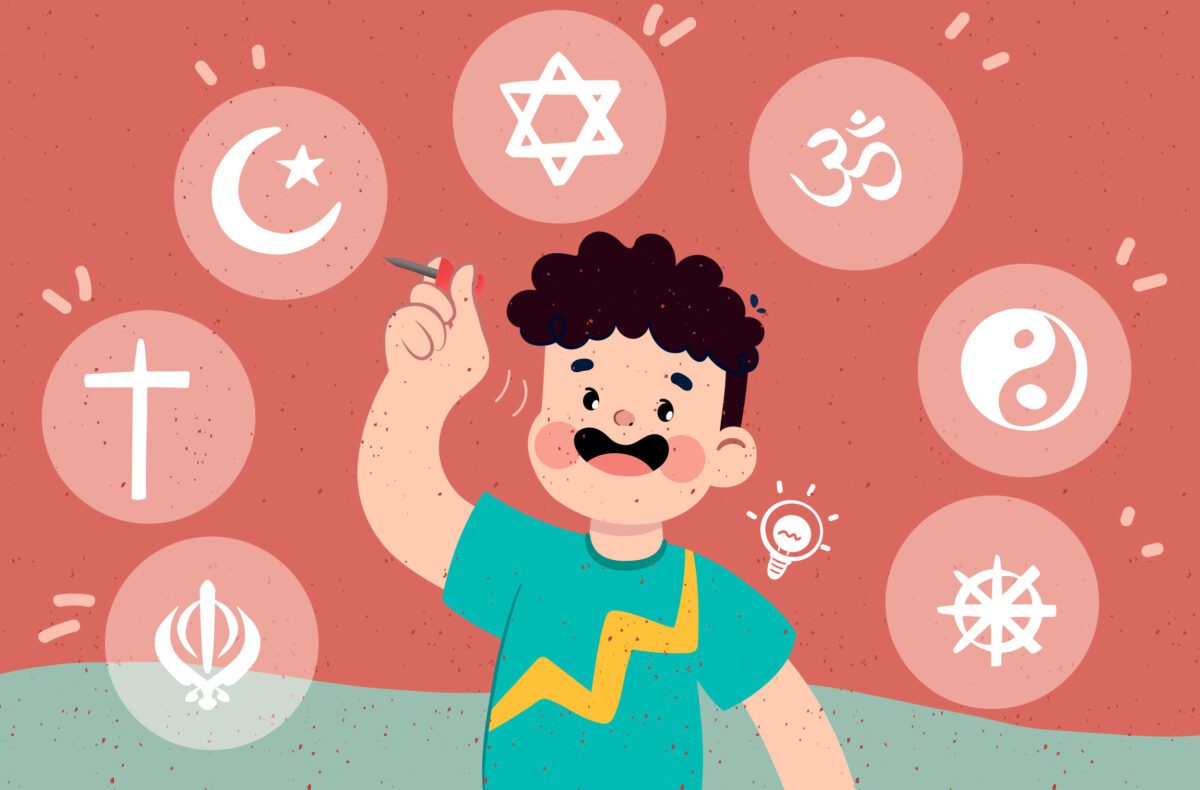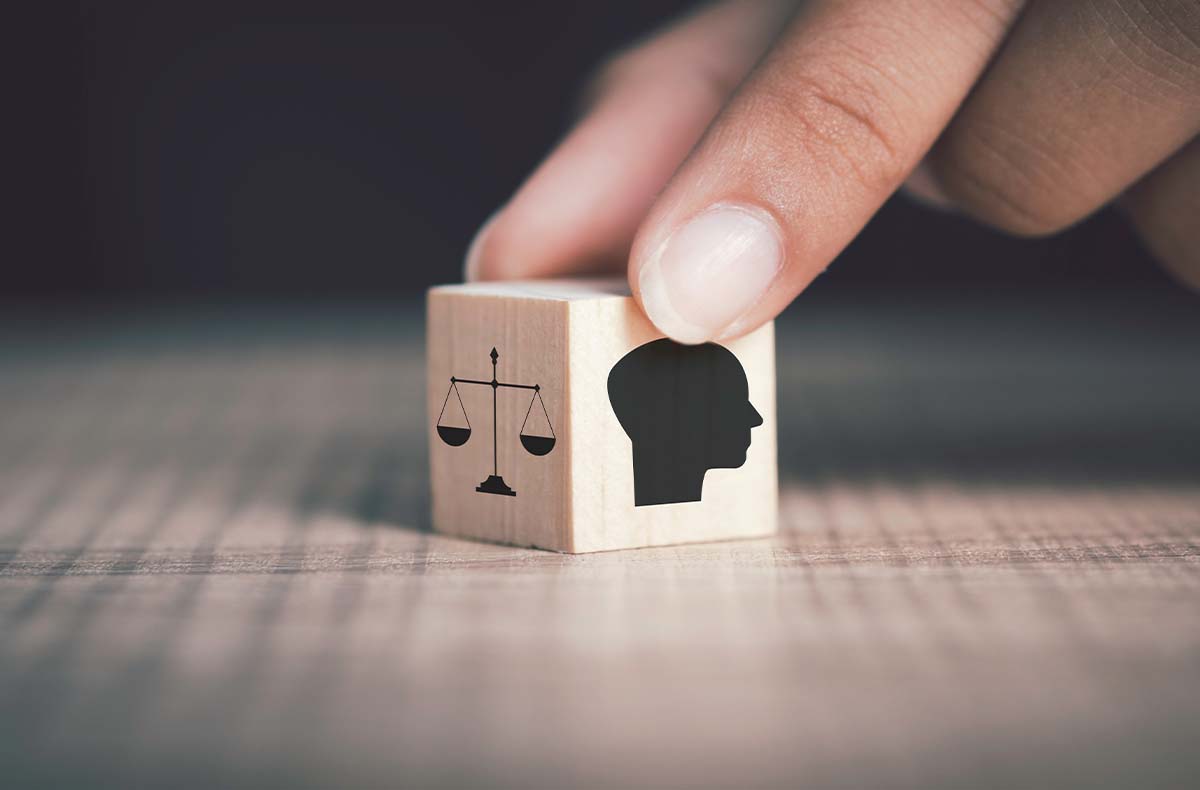
Illustration by Sarameeya Aree
In talking about how to protect kids from corrupted religion, I’ve explained “defanging.” First, I wrote about giving young people enough knowledge about the hand of human authorship in scripture so they can defang attempts by people who try to assert judgment and vengeance based on literal readings of the Bible. Second, I discussed learning about mythology and how Christian and Hebrew stories often have parallels in myths across cultures and across time.
Now it’s time to take on the God problem—particularly the kind of God believed in by most people in Western religions. This is one of the most important things to protect your kids from: the belief that the God held by one particular group of people is privileged over everyone else’s. Non-believers are going to hell. Children may be attacked by some people and religious groups and threatened with eternal fire and damnation.
Kids need to know that there is no such thing as hell. Nor a devil. These are very old myths that most peoples across history have created, but they do not exist in reality. A big reason they have persisted is control—control over individuals, communities, or broad swaths of the population to keep them under the thumb of religious authority.
Just think about the arrogance of the so-called “saved.” Think about a God that would send the majority of humankind to suffer in agony for eternity because they do not accept what one small group of fundamentalist-literalist Christians say. It’s monstrous. Remember an important lesson from child psychology: fear is the lowest form of motivation in moral development.
The God believed in by many Christians is often just a slightly more sophisticated form of Santa Claus—a being who has magical powers. An entity with special knowledge about people’s moral behavior. One who hands out rewards and punishments based on those behaviors. If you put your faith in this type of God, those kinds of believers say that you will be richly rewarded. If you don’t, your soul is in trouble. If bad things happen to “saved” people, then it’s a “mystery.”
Here is a thought experiment that could be discussed with middle school or high school kids. Let’s say we agree with two things about God that are believed by traditional Christianity. One is that God is all-powerful and omnipotent. He can literally do anything. The second is that God is omniscient—he knows everything about the universe, past, present and future.
This means that your existence on earth was ordained and fixed by God. Looking into the future, he knew you would be born. If he is not responsible for you being born, then he is not omnipotent.
Moreover, he dictates everything you do because he had pre-knowledge of it and therefore caused it to be. He has already dictated that you just picked up that cup of coffee or that you will go to the theater this evening. A religion that says that humans can never be more than puppets controlled by a master puppeteer is not worth believing in. It’s bad theology, pure and simple.
What’s more plausible than a Santa Claus or puppeteer God? It’s a God in which all is contained. You have probably heard of the philosophy of pantheism, which contends that God is in all things—rocks, trees, rivers, mountains. My theological school is different. It is, instead—and this is the only big theological word I’ll use in this piece—“panentheism.” Pan = everything; en = within; theism = God. Everything within God.
God is more than the sum of the cosmos (in ways we have difficulty understanding), but God cannot in some way be other than the material, energy and spirituality of the cosmos. What would that even mean? God must incorporate or subsume all things both “seen and unseen,” as one Christian creed has it—this universe and any other universes that might exist.
Does this mean God is just some abstract idea or synonymous with the universe itself, not something living? Far from it. The cosmos that is this God has intentionality. It has direction. As theologian Henry Niemann once wrote, it is “creative power.” I cannot comfort you with a God who holds you in his hand or counts the hairs on your head. But I can tell you that this is a cosmos where, if you fall and cut yourself, the wound will heal. Plants send out seeds. Single-celled organisms move toward nutrients. Living things have offspring. People create.
God is relentless, never failing “ongoingness.” The idea of a God that contains us also protects your kids from one of the major atrocities of conservative, fundamentalist Christianity—its ability to inflict guilt and pain upon both children and adults using a tyrannic, authoritarian God. If something bad happens and you are gay, or if you believe anything other than the precise doctrine they believe in, they say that you deserved it. You are being punished for having disobeyed God.
That is a vicious misuse of religion. Here’s the truth. Events like earthquakes, hurricanes, tornados, or pandemics exist in the world. They are a reality of our planet. There is no meaning to them. Some people live and some die when they occur, but it is never the case that a God chooses to kill some and let others live. We often lament, “why us?” But there is no “why.” There is just an “is.” When disasters occur, God can especially be seen in the ongoingness. Tomorrow comes. Then another tomorrow comes. Human beings come together in love and action to comfort and bind wounds. To rebuild. That’s one of the things we need to teach our children about God.
What are you and your kids left with when mythology and an authoritarian God pulling puppet strings and condemning you are taken out of the picture? In the Christian tradition, you’re left with a guy—a “hero,” as scholars of mythology would say—whose journey was among the poor, the sick, the needy, the suffering and the outcasts. A guy who prioritized those people as needing special care. He’s worth deeper inquiry. One might even try going to church as a way to think more deeply and ritually about that ministry and that courage.
I’m ok with a divinity by which our ends are shaped, not directly but as part of the playing out of the world. I think kids can be fine, too, knowing that there is a kind of divinity that is not separate from them but all around them.
This is a divine power in which we flow and also in which we create and find meaning. Despite terrible examples of tragedy, suffering and evil, this God wants us to live and grow until we cannot do so anymore.
It’s a God of ongoingness. A God of relentless tomorrows. Do you want to know the meaning of life? I’ll tell you what it is: it’s tomorrow.



